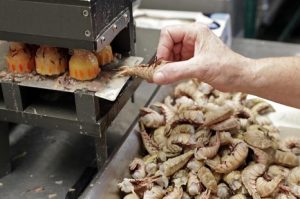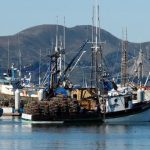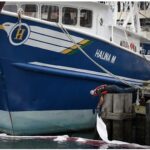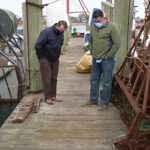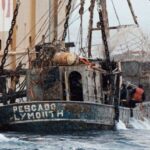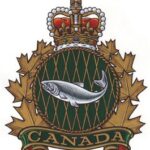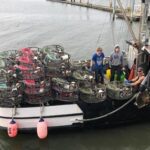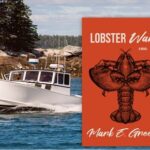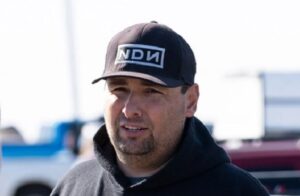Monthly Archives: September 2015
Army Corps withdraws Penobscot Bay dredging application – plan to dispose of contaminated spoils drew local ire
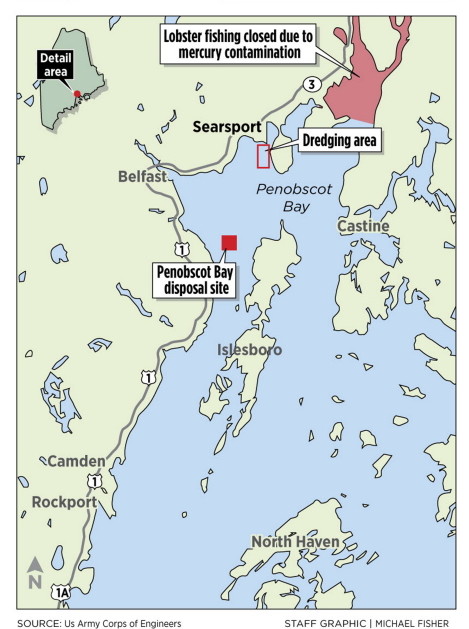 The Army Corps of Engineers withdrew on Tuesday its state permitting application for a Penobscot Bay dredging project opposed by lobstermen, tourism business owners and environmentalists. The project aims to improve and upgrade Searsport, Maine’s second-busiest port, by expanding its turning basin and deepening the approach channel from 35 to 40 feet. But the Corps’ plan for disposing of the nearly 1 million cubic yards of dredged material raised alarm bells up and down Penobscot Bay over concerns it would trigger widespread mercury contamination. Read the rest here 10:38
The Army Corps of Engineers withdrew on Tuesday its state permitting application for a Penobscot Bay dredging project opposed by lobstermen, tourism business owners and environmentalists. The project aims to improve and upgrade Searsport, Maine’s second-busiest port, by expanding its turning basin and deepening the approach channel from 35 to 40 feet. But the Corps’ plan for disposing of the nearly 1 million cubic yards of dredged material raised alarm bells up and down Penobscot Bay over concerns it would trigger widespread mercury contamination. Read the rest here 10:38
Always Top Quality! Your Seafreeze Ltd. Preferred Price List for September 9, 2015
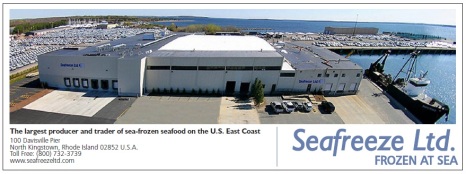 Contact our sales team today @ 401 295 2585 or 800 732 273 Click Here for the complete price list from Seafreeze Ltd. We are Direct to the Source-We are Fishermen-We are Seafreeze Ltd! Visit our website! 10:01
Contact our sales team today @ 401 295 2585 or 800 732 273 Click Here for the complete price list from Seafreeze Ltd. We are Direct to the Source-We are Fishermen-We are Seafreeze Ltd! Visit our website! 10:01
Do Not Blame the Fish – Alicia Rae
 The commercial fishing fleet is to “fault” for the failure of the sports fishermen, in the public mindset. They blame the commercial fleet of stealing “their” target specie, Chinook salmon. Although, they do not factor in their effect on the salmon’s population, with urbanization of the salmon’s native stream, destroying the prime environment for the maximum survival rate and harvesting of the optimal genetic material. Do not blame the fish for getting smaller and the likelihood of being able to catch one simile. The is to blame, not the commercial fleet and definitely not the fish. Read the rest here 08:06
The commercial fishing fleet is to “fault” for the failure of the sports fishermen, in the public mindset. They blame the commercial fleet of stealing “their” target specie, Chinook salmon. Although, they do not factor in their effect on the salmon’s population, with urbanization of the salmon’s native stream, destroying the prime environment for the maximum survival rate and harvesting of the optimal genetic material. Do not blame the fish for getting smaller and the likelihood of being able to catch one simile. The is to blame, not the commercial fleet and definitely not the fish. Read the rest here 08:06
Deadliest year for B.C. fishermen in a decade
 This has become the deadliest year for B.C. fishermen in a decade, following the capsizing of a commercial fishing boat north of Tofino on the weekend, says the Transportation Safety Board. Three crew members died when the Caledonian, owned by Pacific Seafood, capsized Saturday night, at about 8 pm. PT, off Estevan Point on the west coast of Vancouver Island. That brings the number of deaths in B.C. fishing to six for 2015, said Glenn Budden, a senior marine investigator with the Transportation Safety Board. “It’s not been a good year for B.C. fishermen,” Read the rest here 21:45
This has become the deadliest year for B.C. fishermen in a decade, following the capsizing of a commercial fishing boat north of Tofino on the weekend, says the Transportation Safety Board. Three crew members died when the Caledonian, owned by Pacific Seafood, capsized Saturday night, at about 8 pm. PT, off Estevan Point on the west coast of Vancouver Island. That brings the number of deaths in B.C. fishing to six for 2015, said Glenn Budden, a senior marine investigator with the Transportation Safety Board. “It’s not been a good year for B.C. fishermen,” Read the rest here 21:45
Salmon ‘nightmare’ ahead?
 Oregon and Washington will experience two big El Nino-like events in combination this year, scientists and fishery managers say. This has never happened before and the events could have major impacts on commercial and recreational fisheries — and ocean species from salmon to orcas — for years to come. One of these events is a true El Nino — a big one — and brings with it the likelihood of less precipitation and warmer temperatures in the Pacific Northwest. The other event, the “Blob,” is a warm expanse of water that has persisted off the West Coast for over a year and only resembles El Nino. It is an anomaly, a mystery. Read the rest here 19:59
Oregon and Washington will experience two big El Nino-like events in combination this year, scientists and fishery managers say. This has never happened before and the events could have major impacts on commercial and recreational fisheries — and ocean species from salmon to orcas — for years to come. One of these events is a true El Nino — a big one — and brings with it the likelihood of less precipitation and warmer temperatures in the Pacific Northwest. The other event, the “Blob,” is a warm expanse of water that has persisted off the West Coast for over a year and only resembles El Nino. It is an anomaly, a mystery. Read the rest here 19:59
Divide between Newfoundland’s crab fishers, diners is hard to swallow
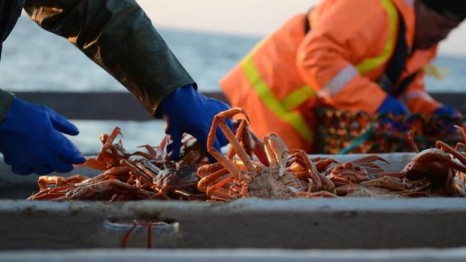 Fishermen have been valued members of society since at least the time of the apostle Peter, a fisherman (and fisher of men) who is still the rock of the Catholic Church. Take Newfoundlander Tony Doyle, the vice-president of the , as well as a grandfather of three and survivor of the infamous 1992 cod moratorium. He’s a really great guy – and he’s getting ripped off by the Canadian government. Read the rest here The writer was doing pretty good ’till he used the chefs such as Hugh Fearnley-Whittingstall thing! 18:49
Fishermen have been valued members of society since at least the time of the apostle Peter, a fisherman (and fisher of men) who is still the rock of the Catholic Church. Take Newfoundlander Tony Doyle, the vice-president of the , as well as a grandfather of three and survivor of the infamous 1992 cod moratorium. He’s a really great guy – and he’s getting ripped off by the Canadian government. Read the rest here The writer was doing pretty good ’till he used the chefs such as Hugh Fearnley-Whittingstall thing! 18:49
Seafood shops take local fish off menu in protest of proposed net-free fishing zones
 Several specialist seafood shops in central Queensland will voluntarily take some items off the menu this week to protest the . “The varieties that people won’t find in the windows this week are the region’s popular estuary fish, including barramundi, king threadfin, blue salmon, diamond-scale mullet and flake,” Mr Swindells said. “These are the fish that local commercial fishermen will no longer be able to catch in a 1500 sq km area taking in the entire Fitzroy River and delta, Port Alma and Corio Bay and out to sea past the Keppel Islands. Read the rest here 18:17
Several specialist seafood shops in central Queensland will voluntarily take some items off the menu this week to protest the . “The varieties that people won’t find in the windows this week are the region’s popular estuary fish, including barramundi, king threadfin, blue salmon, diamond-scale mullet and flake,” Mr Swindells said. “These are the fish that local commercial fishermen will no longer be able to catch in a 1500 sq km area taking in the entire Fitzroy River and delta, Port Alma and Corio Bay and out to sea past the Keppel Islands. Read the rest here 18:17
UK FISHERIES survey logbooks from the 1930s to 1950s have been digitised for the first time – What took them so long?
 Scientists at the Centre for Environment, Fisheries and Aquaculture Science (Cefas) and the University of Exeter found that at the time, the warm seas experienced around Norway benefitted the cod, similar to the conditions there today. The Barents Sea surveys were mainly carried out by the steam vessel RV Ernest Holt, which was commissioned especially to withstand Arctic conditions. Scientists at the time knew that the cod were being affected by their environmental conditions, but digitising this data has meant that much more modern techniques can be used to delve into the responses of cod to changes in their environment and diet. Read the rest here 15:45
Scientists at the Centre for Environment, Fisheries and Aquaculture Science (Cefas) and the University of Exeter found that at the time, the warm seas experienced around Norway benefitted the cod, similar to the conditions there today. The Barents Sea surveys were mainly carried out by the steam vessel RV Ernest Holt, which was commissioned especially to withstand Arctic conditions. Scientists at the time knew that the cod were being affected by their environmental conditions, but digitising this data has meant that much more modern techniques can be used to delve into the responses of cod to changes in their environment and diet. Read the rest here 15:45
NOAA Northwest Fisheries Science Center Scientists link oil exposure to reduced survival of fish
 Federal scientists may have found a link between the 1989 Exxon Valdez oil spill and a decline of herring and pink salmon populations in Prince William Sound.In a study published Tuesday in the online journal Scientific Reports, researchers from the National Oceanic and Atmospheric Administration found that embryonic salmon and herring exposed to even very low levels of crude oil can develop heart defects. Herring and pink salmon juveniles that were exposed to crude oil as embryos grew slower and swam slower, making them vulnerable to predators, said John Incardona, a research toxicologist at NOAA Fisheries’ Northwest Fisheries Science Center in Seattle, in a prepared statement “In terms of impacts to shore-spawning fish, the oil spill likely had a much bigger footprint than anyone realized.” Read the rest here 15:10
Federal scientists may have found a link between the 1989 Exxon Valdez oil spill and a decline of herring and pink salmon populations in Prince William Sound.In a study published Tuesday in the online journal Scientific Reports, researchers from the National Oceanic and Atmospheric Administration found that embryonic salmon and herring exposed to even very low levels of crude oil can develop heart defects. Herring and pink salmon juveniles that were exposed to crude oil as embryos grew slower and swam slower, making them vulnerable to predators, said John Incardona, a research toxicologist at NOAA Fisheries’ Northwest Fisheries Science Center in Seattle, in a prepared statement “In terms of impacts to shore-spawning fish, the oil spill likely had a much bigger footprint than anyone realized.” Read the rest here 15:10
Asian Shrimp Imports Are Chewing Up U.S. Suppliers
 The most-popular seafood in the U.S. isn’t very American anymore, but it sure is getting cheaper. A surge of importedshrimp from Indonesia, Ecuador andIndia has sent prices plunging by more than a third in the past year. While that’s good news for consumers, who eat more of the crustaceans than any aquatic creature, including salmon and tuna, record supplies from foreign shrimp farms is compounding the strain on U.S. fishermen, who have seen their share of the domestic market shrink to about 10 percent. Read the rest here 12:08
The most-popular seafood in the U.S. isn’t very American anymore, but it sure is getting cheaper. A surge of importedshrimp from Indonesia, Ecuador andIndia has sent prices plunging by more than a third in the past year. While that’s good news for consumers, who eat more of the crustaceans than any aquatic creature, including salmon and tuna, record supplies from foreign shrimp farms is compounding the strain on U.S. fishermen, who have seen their share of the domestic market shrink to about 10 percent. Read the rest here 12:08
The Pacific Fishery Management Council will meet September 9‐16, 2015 in Sacramento, California,
 The Pacific Fishery Management Council and its advisory bodies will meet September 9‐16, 2015 in Sacramento, California, to address issues related to management of groundfish, highly migratory species, ecosystem management, salmon, Pacific halibut, and habitat matters. Download the September 9-16, 2015 Meeting Notice WITH Detailed Agenda (includes public comment deadlines and other logistic information) Download the September 9-16, 2015 Detailed Agenda (agenda only) Join the meeting by visiting this link: Click here Webinar ID is: 141-257-515 10:26
The Pacific Fishery Management Council and its advisory bodies will meet September 9‐16, 2015 in Sacramento, California, to address issues related to management of groundfish, highly migratory species, ecosystem management, salmon, Pacific halibut, and habitat matters. Download the September 9-16, 2015 Meeting Notice WITH Detailed Agenda (includes public comment deadlines and other logistic information) Download the September 9-16, 2015 Detailed Agenda (agenda only) Join the meeting by visiting this link: Click here Webinar ID is: 141-257-515 10:26
Commercial fisherman remembers 3 colleagues who died when their boat, the Caledonian, capsized
 A crew member from the sister ship of the one that capsized off Vancouver Island over the weekend, is speaking out about the loss of three men and the decision that saved a fourth man’s life. “They were good, hardworking family-loving men who unfortunately aren’t going to make it home tonight,” said one fisherman who did not want to be identified. He has worked on both and its sister ship, the Viking Storm. The Caledonian is the boat that capsized. Captain Wes Hegglend and two other crew members died when the Caledonian experienced what is believed to be some kind of stabilization issue and capsized. Video interview Read the rest here 07:21
A crew member from the sister ship of the one that capsized off Vancouver Island over the weekend, is speaking out about the loss of three men and the decision that saved a fourth man’s life. “They were good, hardworking family-loving men who unfortunately aren’t going to make it home tonight,” said one fisherman who did not want to be identified. He has worked on both and its sister ship, the Viking Storm. The Caledonian is the boat that capsized. Captain Wes Hegglend and two other crew members died when the Caledonian experienced what is believed to be some kind of stabilization issue and capsized. Video interview Read the rest here 07:21
Bristol Bay 2015 season summary: 3rd-largest run ever
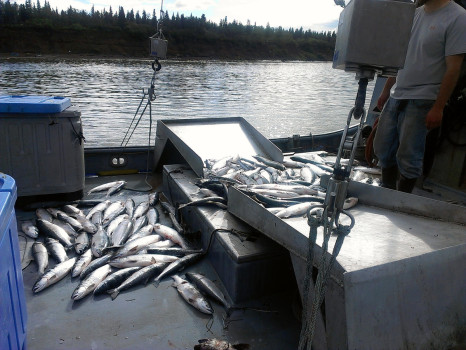 The Department of Fish and Game released a summary of the Bristol Bay 2015 fishing season, now noting a total inshore run of 58 million sockeye salmon. That makes 2015 a near-record-setting year, says Fish and Game area biologist Tim Sands. “It’s second out of the last 20 years – the only one that beat it was 1995 – and it’s the third-largest run of all time,” said Sands. This year’s harvest was counted at 37.6 million sockeye, which Sands say is the fourth largest ever, using records going back to the 1880s. Read the rest here 20:52
The Department of Fish and Game released a summary of the Bristol Bay 2015 fishing season, now noting a total inshore run of 58 million sockeye salmon. That makes 2015 a near-record-setting year, says Fish and Game area biologist Tim Sands. “It’s second out of the last 20 years – the only one that beat it was 1995 – and it’s the third-largest run of all time,” said Sands. This year’s harvest was counted at 37.6 million sockeye, which Sands say is the fourth largest ever, using records going back to the 1880s. Read the rest here 20:52
FISHY BUSINESS: Support your neighborhood fisherman – It’s So Sexy!
 Last month this column bemoaned the economic challenges of the local fishing fleet and examined why we are seeing fewer and fewer commercial fishing boats in Scituate Harbor. To recap, the basic problem is that over regulation has reduced the ability of fishing businesses to harvest a reasonable amount of fish and sell it for a price that is profitable. Further, the infrastructure that supports fishing is more focused on processing foreign fish instead of the local supply. The good news for both fishermen and consumers alike is there is an alternative to the “old economy” of fishing through Scituate’s own community supported fishery, South Shore Seafood Exchange, Inc. (SOSSEXI). That’s right, it is pronounced, “So Sexy.” Read the rest here 17:31
Last month this column bemoaned the economic challenges of the local fishing fleet and examined why we are seeing fewer and fewer commercial fishing boats in Scituate Harbor. To recap, the basic problem is that over regulation has reduced the ability of fishing businesses to harvest a reasonable amount of fish and sell it for a price that is profitable. Further, the infrastructure that supports fishing is more focused on processing foreign fish instead of the local supply. The good news for both fishermen and consumers alike is there is an alternative to the “old economy” of fishing through Scituate’s own community supported fishery, South Shore Seafood Exchange, Inc. (SOSSEXI). That’s right, it is pronounced, “So Sexy.” Read the rest here 17:31
Premier in Asia to help N.S. seafood firms promote products
 Representatives of five Nova Scotia seafood companies promoted their products, with help from Premier Stephen McNeil, at an event in Guangzhou, China Monday. Asia is the third-largest market for Nova Scotia seafood exports and the companies provided chef demonstrations and company presntations. Seafood exports to the region made $132 million in 2014, according to a government media release. The companies are: Gidney Fisheries of Centreville, NovaCan Live Seafood of Arichat, United Trans of Halifax, Atlantic Canada Resources of Dartmouth and Ocean Pride Fisheries from Lower Wedgeport. Read the rest here 13:36
Representatives of five Nova Scotia seafood companies promoted their products, with help from Premier Stephen McNeil, at an event in Guangzhou, China Monday. Asia is the third-largest market for Nova Scotia seafood exports and the companies provided chef demonstrations and company presntations. Seafood exports to the region made $132 million in 2014, according to a government media release. The companies are: Gidney Fisheries of Centreville, NovaCan Live Seafood of Arichat, United Trans of Halifax, Atlantic Canada Resources of Dartmouth and Ocean Pride Fisheries from Lower Wedgeport. Read the rest here 13:36
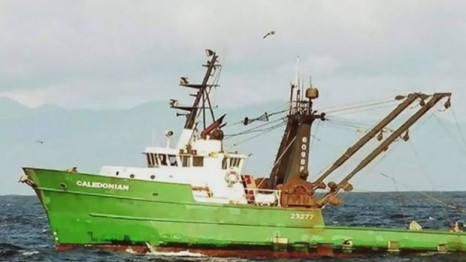
B.C. tragedy as 3 fisherman drown off Tofino, one survives
The fishing boat, the Caledonian, with four fishermen onboard capsized in Pacific Ocean waters off of the town of Tofino on Vancouver Island Saturday. Three of them are dead and one survivor was plucked from the waters. Navy Lt. Nicole Murillo with the Joint Rescue Co-ordination Centre said the survivor revealed that the men were hauling in a net with a large catch in it when the 33-metre boat listed over into the water; the survivor said they knew the situation was dangerous but were unable to get the ship back upright. “They tried to correct it,” Lt. Murillo said. “But unfortunately the ship capsized and subsequently sunk.” Read the rest here 09:45
Groundfish industry taking another hit with addition of at-sea monitors – Steve Urbon
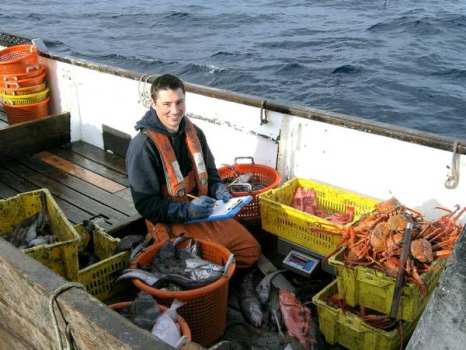 So this is how it looks. The gradual collapse of the New England groundfish industry continued last week as about two dozen people jammed into a meeting room of the state’s Division of Marine Fisheries office in the former voc-tech school on Purchase Street to argue about the distribution of disaster relief money allocated by Congress. Adding insult to injury is the impending shift of costs for at-sea monitors to the fishing boats. Fishing industry advocates liken this to a shotgun wedding, in which the boats have no choice but to sign a contract with a third party with no say in the price being paid. Read the rest here 09:09
So this is how it looks. The gradual collapse of the New England groundfish industry continued last week as about two dozen people jammed into a meeting room of the state’s Division of Marine Fisheries office in the former voc-tech school on Purchase Street to argue about the distribution of disaster relief money allocated by Congress. Adding insult to injury is the impending shift of costs for at-sea monitors to the fishing boats. Fishing industry advocates liken this to a shotgun wedding, in which the boats have no choice but to sign a contract with a third party with no say in the price being paid. Read the rest here 09:09
Shrimp: a Little Creature’s Big Impact by Matt Rhoney
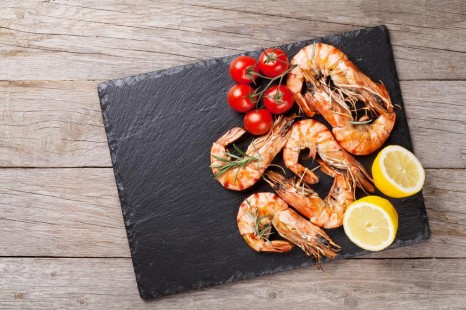 Shrimp has had a wide-ranging set of influences on the United States. This buggy little sea-creature has brought cash flow into our economy, nutrients into our bodies, and life into our culture. No matter where you live, you’ve definitely felt their impact. The next time you think of shrimp, remember the outsized impact of these pint-sized crustaceans. Economics: For huge populations of people, particularly those living in maritime climates, shrimp are more than cute critters; they’re a main source of livelihood. In Louisiana, fishermen landed around,,, Read the rest here 17:09
Shrimp has had a wide-ranging set of influences on the United States. This buggy little sea-creature has brought cash flow into our economy, nutrients into our bodies, and life into our culture. No matter where you live, you’ve definitely felt their impact. The next time you think of shrimp, remember the outsized impact of these pint-sized crustaceans. Economics: For huge populations of people, particularly those living in maritime climates, shrimp are more than cute critters; they’re a main source of livelihood. In Louisiana, fishermen landed around,,, Read the rest here 17:09
UPDATED: Commercial Fishing Vessel Caledonian capsizes off Tofino, B.C., three dead
 A commercial fishing boat capsized off the coast of Vancouver Island overnight Saturday, killing at least two men. The boat capsized about 50 kilometres west of Tofino, B.C., according to Lieutenant Nicole Murillo, with the Joint Rescue Coordination Centre. The cause of the accident was not immediately known, Murillo said. Three Coast Guard boats and a helicopter continued to search for a third person Sunday. Rescue crews located one survivor, who was found wearing a life jacket and floating on a safety raft. He was taken to a Victoria hospital by cruise ship. Read the rest here 16:08
A commercial fishing boat capsized off the coast of Vancouver Island overnight Saturday, killing at least two men. The boat capsized about 50 kilometres west of Tofino, B.C., according to Lieutenant Nicole Murillo, with the Joint Rescue Coordination Centre. The cause of the accident was not immediately known, Murillo said. Three Coast Guard boats and a helicopter continued to search for a third person Sunday. Rescue crews located one survivor, who was found wearing a life jacket and floating on a safety raft. He was taken to a Victoria hospital by cruise ship. Read the rest here 16:08
Federal models for saving the species have proved faulty as Feds scramble to avoid another mass salmon die-off in the Sacramento River
 Larry Collins, a commercial fisherman operating out of Pier 45 in San Francisco, said that in the fight over water, the fishing industry – and wild fish – lack the political clout compared with municipal and agricultural interests.“I’ve been around a long time, and I’ve fought the battle for a long time, and I’ve watched the water stolen from the fish,” he said. “The fish are in tough shape because their water is growing almonds down in the valley. To me, it’s just outright theft of the people’s resource for the self-aggrandizement of a few, you know?” “You got money you can buy anything,” he added. “You can buy extinction.” Read the rest here 12:57
Larry Collins, a commercial fisherman operating out of Pier 45 in San Francisco, said that in the fight over water, the fishing industry – and wild fish – lack the political clout compared with municipal and agricultural interests.“I’ve been around a long time, and I’ve fought the battle for a long time, and I’ve watched the water stolen from the fish,” he said. “The fish are in tough shape because their water is growing almonds down in the valley. To me, it’s just outright theft of the people’s resource for the self-aggrandizement of a few, you know?” “You got money you can buy anything,” he added. “You can buy extinction.” Read the rest here 12:57
Rhode Island Fishermen’s Alliance Weekly Update, September 6, 2015

The Rhode Island Fishermen’s Alliance is dedicated to its mission of continuing to help create sustainable fisheries without putting licensed fishermen out of business.” Read the update here To read all the updates, click here 12:04
Campbell: Flounder changes fishy
 When I was a boy we could walk out on the shore of our Neuse River summer home, cast out a line on a rod and reel and catch enough good-sized Croakers for supper in about an hour. Many an afternoon was spent “crabbing.” We would tie a fish head on a string, weighting it down it with several nails or a lead sinker, throw it in the river and before long a Blue crab would be tugging on your line. Using a pole net we could usually catch enough for momma to make a delicious crab stew. Those “good old days” are long gone for reasons that include topsoil runoff, sewerage spills and pollution, but chief among them is the overfishing of our waters by commercial fishermen. Read the rest here 10:51
When I was a boy we could walk out on the shore of our Neuse River summer home, cast out a line on a rod and reel and catch enough good-sized Croakers for supper in about an hour. Many an afternoon was spent “crabbing.” We would tie a fish head on a string, weighting it down it with several nails or a lead sinker, throw it in the river and before long a Blue crab would be tugging on your line. Using a pole net we could usually catch enough for momma to make a delicious crab stew. Those “good old days” are long gone for reasons that include topsoil runoff, sewerage spills and pollution, but chief among them is the overfishing of our waters by commercial fishermen. Read the rest here 10:51
New England – Experts Say Wasteful Fishing Regulations Not Keeping Pace With Climate Change
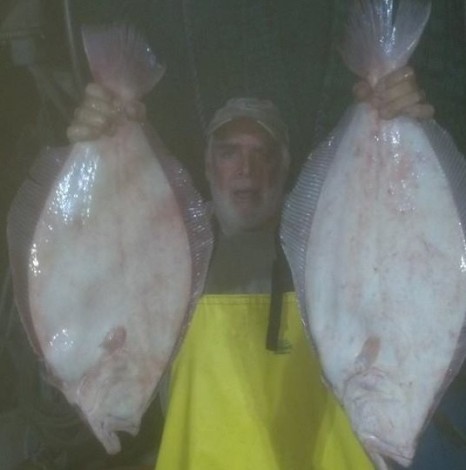 Hundreds of thousands of pounds of valuable fish caught off Connecticut’s coast are thrown overboard every year, and 80 percent of them are dead by the time they hit the water, experts say. Commercial fishermen, environmentalists and state officials say a prime reason for such a stunning waste of a natural resource is an out-of-date federal regulatory system that hasn’t kept up with the realities of a changing climate and shifting fish populations. “The whole construct of the [regulatory] system needs to be questioned,” said Curt Johnson. Read the rest here 09:26
Hundreds of thousands of pounds of valuable fish caught off Connecticut’s coast are thrown overboard every year, and 80 percent of them are dead by the time they hit the water, experts say. Commercial fishermen, environmentalists and state officials say a prime reason for such a stunning waste of a natural resource is an out-of-date federal regulatory system that hasn’t kept up with the realities of a changing climate and shifting fish populations. “The whole construct of the [regulatory] system needs to be questioned,” said Curt Johnson. Read the rest here 09:26
Activity increasing all along New Bedford Harbor
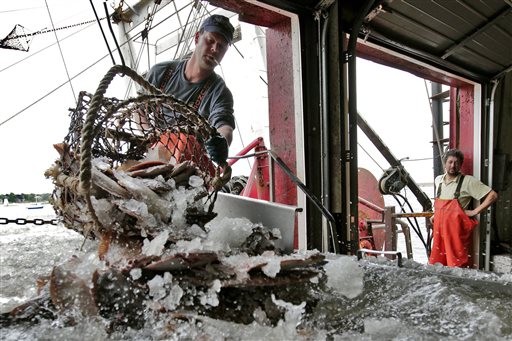 The Port of New Bedford is not only home to the vastly profitable scallop industry, making it the No. 1 value fishing port in the nation, it is also the No. 2 commercial port in Massachusetts, after Boston. Commercial and recreational activity in the port has grown by leaps and bounds in recent years, with an occasional setback. Shoreside fish processors, meanwhile, are bringing in fish from other sources to be put through value-added processing before shipping to distributors. Read the rest here 07:45
The Port of New Bedford is not only home to the vastly profitable scallop industry, making it the No. 1 value fishing port in the nation, it is also the No. 2 commercial port in Massachusetts, after Boston. Commercial and recreational activity in the port has grown by leaps and bounds in recent years, with an occasional setback. Shoreside fish processors, meanwhile, are bringing in fish from other sources to be put through value-added processing before shipping to distributors. Read the rest here 07:45
“What are they smoking?” – Fishers should have a say in offshore drilling planning
“What are they smoking?” was my initial reaction to media reports the federal environmental protection agency signed off on June 15 on a proposal by Shell Canada to start exploratory drilling in the Shelburne Basin off southwestern Nova Scotia. The real bombshell wasn’t the drilling in water depths ranging from 500 to 3,500 metres some 250 km southwest of Halifax, slated to begin in 2015-2016. No, the real bombshell was that federal Environment Minister Leona Aglukkaq had reportedly approved Shell’s window of 12 to 21 days to bring an emergency response vessel and on site in the event of a well blowout. Read the rest here 15:04
NOAA urged to expedite decision to allow the American Samoa purse seiner fleet to fish in the high seas.
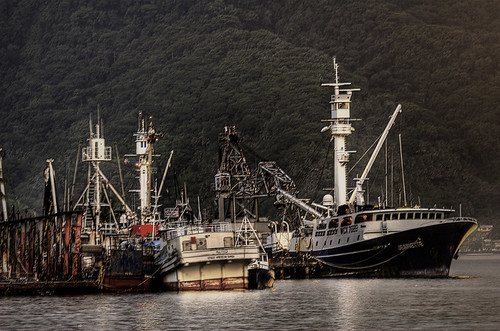 Tri Marine International’s CEO, Mr. Renato Curto and Chief Operating Officer, Mr. Joe Hamby visited senior NOAA and Department of Commerce officials in Washington, D.C. this week urging them to expedite their decision on the petition to allow the American Samoa purse seiner fleet to fish in the high seas. NOAA’s public comment period on the petition ended on August 17th.Over 100 comments were received, only four of which were against the petition. Heidi Happonen, spokesperson for Tri Marine said with such broad support for restoring access to the high seas,,, Read the rest here 12:52
Tri Marine International’s CEO, Mr. Renato Curto and Chief Operating Officer, Mr. Joe Hamby visited senior NOAA and Department of Commerce officials in Washington, D.C. this week urging them to expedite their decision on the petition to allow the American Samoa purse seiner fleet to fish in the high seas. NOAA’s public comment period on the petition ended on August 17th.Over 100 comments were received, only four of which were against the petition. Heidi Happonen, spokesperson for Tri Marine said with such broad support for restoring access to the high seas,,, Read the rest here 12:52
Plethora of pinks gives Alaska fishermen pause
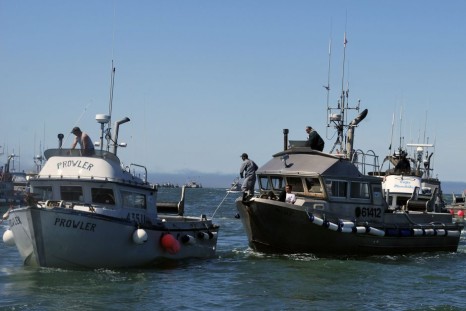 Alaska’s pink salmon catch is pushing 180 million fish, making it the second largest harvest ever; the 219 million pinks of 2013 remains the record. Alaska’s humpy haul has been pushed by the record production of three regions – more than 15 million pinks were taken from the Alaska Peninsula, compared to less than 1 million last year. Kodiak’s record pink catch is nearing 30 million, triple last year’s take. And Prince William Sound’s harvest has already topped 97 million pink salmon. All that fish goes into a competitive global market and, in a word, the pink market stinks. Read the rest here 12:14
Alaska’s pink salmon catch is pushing 180 million fish, making it the second largest harvest ever; the 219 million pinks of 2013 remains the record. Alaska’s humpy haul has been pushed by the record production of three regions – more than 15 million pinks were taken from the Alaska Peninsula, compared to less than 1 million last year. Kodiak’s record pink catch is nearing 30 million, triple last year’s take. And Prince William Sound’s harvest has already topped 97 million pink salmon. All that fish goes into a competitive global market and, in a word, the pink market stinks. Read the rest here 12:14
Vancouver Aquarium wants to mix conservation with commercial aquaculture!
 The Vancouver Aquarium has long trumpeted its dedication to conservation of aquatic life. Under a new and potentially controversial initiative, the institution wants to have its fish and eat them, too, by launching into the commercial aquaculture business. The pitch goes like this: local rockfish populations such as those in Howe Sound have suffered due to poaching, while European and Japanese eels have been heavily overharvested, including for the sushi market. Enter the aquarium with the notion of sustainable farming of rockfish and wolf eels to take some pressure off wild stocks while turning a buck at the same time. Read the rest here 10:33
The Vancouver Aquarium has long trumpeted its dedication to conservation of aquatic life. Under a new and potentially controversial initiative, the institution wants to have its fish and eat them, too, by launching into the commercial aquaculture business. The pitch goes like this: local rockfish populations such as those in Howe Sound have suffered due to poaching, while European and Japanese eels have been heavily overharvested, including for the sushi market. Enter the aquarium with the notion of sustainable farming of rockfish and wolf eels to take some pressure off wild stocks while turning a buck at the same time. Read the rest here 10:33
State floats new plan for fishing disaster money in New Bedford on Friday
 The state Division of Marine Fisheries listened to those who wanted a wider distribution of $6.7 million in federal fisheries disaster money. At a meeting of the groundfish disaster aid working group in New Bedford on Friday, the agency laid out a plan where more than $6 million of the money would be used in direct aid to fishermen. While an earlier proposal set a fairly high bar of 20,000 pounds of groundfish landings in any year from 2012 to 2014 to qualify for aid, the new plan would require 10,000 pounds of groundfish or have at least one trip in 2014 on which a vessel carried an observer. Read the rest here 10:10
The state Division of Marine Fisheries listened to those who wanted a wider distribution of $6.7 million in federal fisheries disaster money. At a meeting of the groundfish disaster aid working group in New Bedford on Friday, the agency laid out a plan where more than $6 million of the money would be used in direct aid to fishermen. While an earlier proposal set a fairly high bar of 20,000 pounds of groundfish landings in any year from 2012 to 2014 to qualify for aid, the new plan would require 10,000 pounds of groundfish or have at least one trip in 2014 on which a vessel carried an observer. Read the rest here 10:10
































